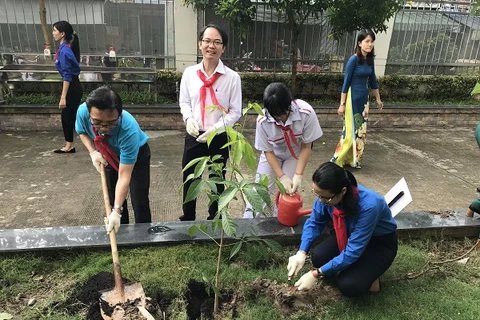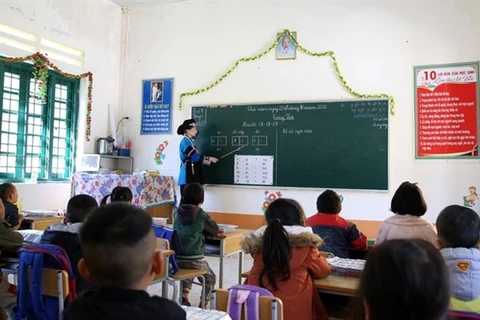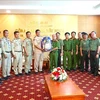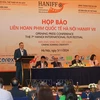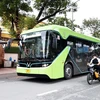 Hoang Van Anh, Director for Education and Society at the British Council Vietnam, speaks at the dialogue (Photo: VietnamPlus)
Hoang Van Anh, Director for Education and Society at the British Council Vietnam, speaks at the dialogue (Photo: VietnamPlus) Hanoi (VNA) – Up to 72 percent of 1,200 Vietnamese youngsters and adolescents said they believe that in the next 15 years, things will get better than they were before 2019.
Meanwhile, 37 percent said they plan to run their own business, according to a report released recently by the British Council.
According to the Next Generation Vietnam report, the majority of youngsters are confident that Vietnam is working hard to improve the living conditions of all its citizens.
They expressed optimism about education and employment opportunities in the future, while hoping for more practical training programmes, Hoang Van Anh, Director for Education and Society at the British Council Vietnam told a dialogue on the enhancement of the role and engagement of youngsters regarding development issues held in Hanoi on January 15.
37 percent of young Vietnamese want to run their own business
Anh said the project is the first comprehensive survey by the British Council on the attitudes of youngsters towards matters directly relating to them. The report aims to help youngsters in countries that are experiencing important socio-economic changes to raise their voice.
The report showed that an entrepreneurial spirit thrives in Vietnam. Nearly four in ten (37 percent) respondents to the survey behind the report plan to eventually start their own business, regardless of their socio-economic background. During interviews and focus group discussions (FGDs), respondents lauded entrepreneurship as offering an authority and freedom unmatched by working for others.
At the dialogue, Professor Dang Hai Anh, a senior economist with the World Bank, said that in the next 10 to 15 years, Vietnam will see its “golden population” period end and will enter a period of population aging, which means working people will bear more burdens. Policies relating to young people, he said, will be a significant matter over the course of the next 10-15 years.
“Nearly 40 percent of youth want to run their own business, which is very much different to the older generation, revealing a strong startup spirit among youngsters,” Anh said.
He cited the experience of other countries in underlining the need for Vietnam to enhance the role and involvement of youngsters in developing issues and equipping them with modern skills such as self-study, English, computer skills, and group working.
It is necessary to encourage and create favourable conditions for young people to make more contributions to the building of e-government, such as supervising activities relating to youth and providing regular feedback, he added.
Limited connections
Nguyen Thien Tu, Director of the Centre for Vietnam Youth Talent, Science and Technology (CYTAST) under the Ho Chi Minh Communist Youth Union Central Committee, said that in order to promote the role of youth, the committee has organised movements to create the environment for them to show their talent, including IT contests, start-up competitions, and awards.
According to Tu, CYTAST is keeping data on 5,000 young Vietnamese talents. Connection activities, however, remain a weakness of the centre due to a number of issues, including the poor engagement of enterprises and organisations.
Measures to discover, support, promote, and use talents have shown modest efficiency and stability, he said.
Topics discussed at the dialogue were practical, with suggestions on assisting and optimising young Vietnamese talent as well as policies to encourage their involvement in social issues, he said./.
| Activities within the framework of the dialogue on the Next Generation Vietnam report from the British Council and the Science-Technology Development Programme of the Global Vietnamese Young Scholars Association will take place in the two first months of 2021, with the engagement of prestigious speakers, representatives from universities and schools in Hanoi, and a large number of youngsters. |


